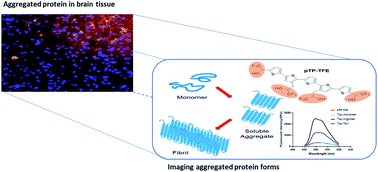A fluorescent molecular imaging probe with selectivity for soluble tau aggregated protein†
Abstract
Soluble forms of aggregated tau misfolded protein, generally termed oligomers, are considered to be the most toxic species of the different assembly states that are the pathological components of neurodegenerative disorders. Therefore, a critical biomedical need exists for imaging probes that can identify and quantify them. We have designed and synthesized a novel fluorescent probe, pTP-TFE for which binding and selectivity profiles towards aggregated tau and Aβ proteins were assessed. Our results have shown pTP-TFE to be selective for early forms of soluble tau aggregates, with high affinity of dissociation constants (Kd) = 66 nM, and tenfold selectivity over mature tau fibrils. Furthermore, we found that pTP-TFE is selective for tau over Aβ aggregates and had good cell permeability. This selectivity of pTP-TFE towards early forms of aggregated tau protein ex vivo was also supported with studies on human brain tissue containing tau and Aβ pathology. To the best of our knowledge, this is the first fluorescent molecule to be reported to have this form of selectivity profile, which suggests that pTP-TFE is a unique probe candidate for imaging-based detection of early stages of Alzheimer's disease and other tauopathies.



 Please wait while we load your content...
Please wait while we load your content...